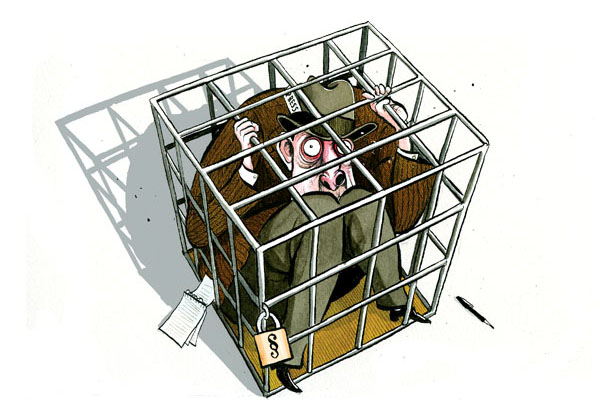The newspaper industry is apparently working this weekend on a new response to the Leveson inquiry. This should be an interesting exercise. Throughout this imbroglio, the British press has proven itself almost comically incapable of collusion; to collectively agree on anything is not in the nature of our fiercely-competitive newspapers. This makes for healthy competition and democracy: no one can ‘square’ the press in Britain because there are too many newspapers who dislike each other too much. But this has been a problem for the press, in general, during the Leveson inquiry.
Hacked Off produced a very well-run campaign and presented a united front. But as Charles Moore argued in The Spectator, the press got to work insulting and exposing each other. The ordinary voter – looking on at this fight between journalists, politicians, celebrities and their lawyers – might think it a shame they could not all lose. But just as capitalism needs to be saved from the capitalists now and again, the free press needs saving from the press.
Some newspapers are even arguing against press freedom: The Guardian wants state regulation which would no doubt create an environment better suited to its own style of journalism. The BBC, which had signed an anti-Murdoch petition when the Dirty Digger looked like he wanted to apply rocket boosters on BSkyB, was leading last night’s news bulletins on a spurious “petition”from Hacked Off with 25,000 signatures demanding (as Ed Miliband does) the full implementation of the Leveson Report.
A friend told me he put “Donald Duck” down ten times on the Hacked Off petition, and watched its system register click up ten times – so I’m not sure how real this petition is. Or how much they (or the BBC) care how real the names are. The war is still going on – and some are still fighting for a Leveson world where a government-validated pious elite (like the folk in the Media Standards Trust, which begat Hacked Off) oversees the press. It’s a shame that it has acquired the nickname Whacked Off, because its aim is not (just) to make life easier for priapic celebrities or F1 magnates. It is about something worse: the notion of the press conforming to the values of a panel of the great and the good.
Most people don’t take a national newspaper nowadays, and journalists – who have never been a much-loved species – now rank with estate agents and the winter vomiting bug in the national unpopularity stakes. This creates a problem for Cameron. In protecting press freedom, he embraces a deeply unpopular cause. He has said he’d like to save it, but needs to see what improvements the press can make to their proposals for self-regulation. Hence the pressure on the newspapers to come up with something more than their last proposal (a system of fines and contracts).
Even if Cameron rejects Leveson, the threat of state regulation will survive in the form of Ed Miliband. The Labour leader said he accepts all 1,990 pages of the Leveson Report (he said this before he’d read them) and I suspect Osborne’s lack-of-progress report on Wednesday will remind us that Labour is still of course to win the next general election.
The Spectator’s position remains simple: we will never sign up to any state-mandated regulator, we won’t attend its meetings nor pay its fines, nor pay any other surcharge that may be levied on an unlicensed publication. Given that editors are personally and legally responsible for magazines, this raises the question of what would happen to those of us who reject state regulation on principle. As editor, I’d find out. And I’m pretty sure The Spectator will not be the only publication taking this stand.
So will Miliband keep Leveson as a manifesto pledge, meaning the tradition of press freedom that began in 1695 might end in 2015? It is a major (and deeply illiberal) position, and Hacked Off would have Miliband believe that the public demand it. I’m not so sure. The indications are that everyone’s bored of this already. Look at the most-read stories from the BBC to the Daily Mail – Leveson doesn’t even make the top ten.
In 1981, some 72pc of us read national newspapers. Now it’s 36pc and declining rapidly. Contrary to what Nick Clegg said in his statement, the press is not horribly powerful today. Newspapers are, collectively, haemorrhaging sales, power and influence. They have never been weaker at any time in our modern history. Look closely and you can see that the appalling scandals stem from the weakness and disaggregation of the media. This meant subcontracting reporting to ersatz outfits like the “Bureau for Investigative Journalism”, or getting hooked on illegal dope supplied by hackers rather than journalists.
The arrests will have told every journalist what now happens to those who get stories thanks to illegal information bought from hackers. They don’t need state regulation to take this lesson to heart. But the real problem is seemingly terminal decline of print. The industry is on the wrong end of an industrial revolution. On current trends the FT, Guardian, Express and the Independent will be gone within ten years.
The newspapermen may survive Leveson, for now. But they are, collectively, still trapped in a fight for survival.







Comments